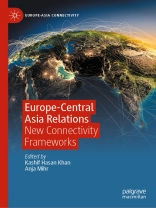This book addresses the current state of economic and political development within Central Asia and the importance of European countries and organizations as international actors and supranational organizations for the Central Asian Region (CAR). It aims to provide a better understanding of Central Asia’s multi-faceted relations in rapidly evolving geostrategic dynamics and serves as a timely insight into the contours of Central Asian states’ policies, emerging trends, and significant features of these interactions. The aim is to analyze the main challenges for future between the Europe and Central Asia relations, to make recommendations for improvement, and to identify lines for future research on this matter. It highlights key aspects of current discourses in CAR vis-à-vis the role of European countries and China and other key players. It explores post-Soviet scenarios, considering recent drastic changes in the equation of international relations in general and, more particularlythe role of Russia and China vis-à-vis Europe in the CARs. This book covers the different perspectives on the EU’s new strategy (2019), which will contribute to strengthening relations between the two growing regions. It will be beneficial for academics, practitioners, and policymakers.
Cuprins
1. Introduction and Background to the Book (Kashif Hasan Khan & Anja Mihr).- I Contextual overview of European policies towards Central Asia.-. 2 Assessing Europe – Central Asia Connectivity through Linkage and leverage (Ana-Maria Anghelescu).- 3 The Policies of the European Union and Russia vis-à-vis Central Asia (Agnieszka Kuszewska).- 4 The 2019 European Union Strategy on Central Asia: Future Challenges (Ana Belén Perianes Bermúdez).- 5 The European Union’s Sustainability Standardisation of World Trade: A Challenge for Central Asia? (Axel Marx & Nazik Beishenaly).- 6 Development of Central Asia and European Union’s Assistance Programme (Bedelbai Mamadiev).- II Central Asia’s Connectivity: Human Rights, Rule of Law and Good Governance.- 7 Human Rights in Central Asian States and European Initiatives (Anja Mihr).- 8 European-Central Asian International Election Obser-vation cooperation (Rick Fawn).- 9 Implementing Good Governance in the Framework of Europe’s New Strategy for Central Asia: Lessons from the Baltics (Ivo Rollis).- III Old Games in New Frameworks: Regional and Geopolitical Perspectives.- 10 Great Game vs Small Game: Europe, India, and Japan in Central Asia (Raj Kumar Sharma).- 11 Regional Connectivity and the China factor (Bipul Biplav Mukherjee).- 12 EU-Central Asian Cooperation on Border Manage-ment, Migration and Mobility (Ildar Daminov).
Despre autor
Kashif Hasan Khan is Associate Professor and Director of the Silk Road Research Center, Ala-Too International University in Bishkek. He teaches at the Economics Department of Ala-Too and the Finance Department of International Black Sea University, Tbilisi. Previously, Kashif worked as International Business Consultant in the Philippines, and as a consultant economist with the Asian Development Bank. His latest works on Central Asia include Emerging Central Asia: Managing Great Powers Relations (Blue Dome Press) and The Strategy of (Re) Connectivity: Revisiting India’s Multifaceted Relations with Central Asia.
Anja Mihr is DAAD Associate Professor at the OSCE Academy in Bishkek and Director of the Master Program for Human Rights and Sustainability (MAHRS) in Central Asia. She is a professor of human rights, governance, public policy and transitional justice. Prof. Mihr is also the Founder and Program Director of the Center on Governance through Human Rights at the Berlin Governance Platform. She has held full professorships at the Willy-Brandt School of Public Policy, Erfurt University, Germany, and at the Netherlands Institute of Human Rights (SIM), University of Utrecht and at SIPA, Columbia University in New York. From 2006-2008 she was the European Program Director for the European MA Degree in Human Rights and Democratization (E.MA) at the Global Campus for Human Rights in Venice.












